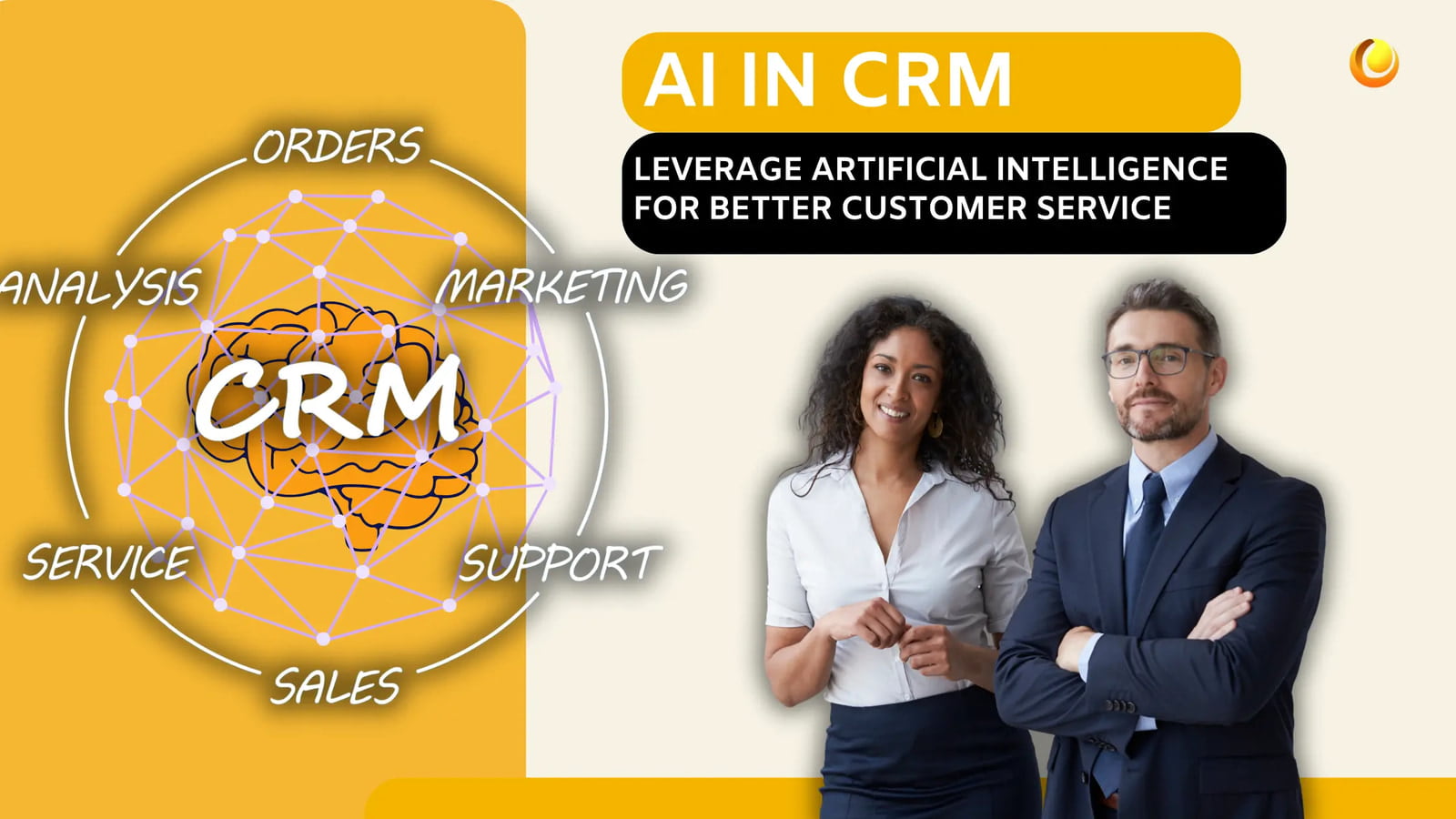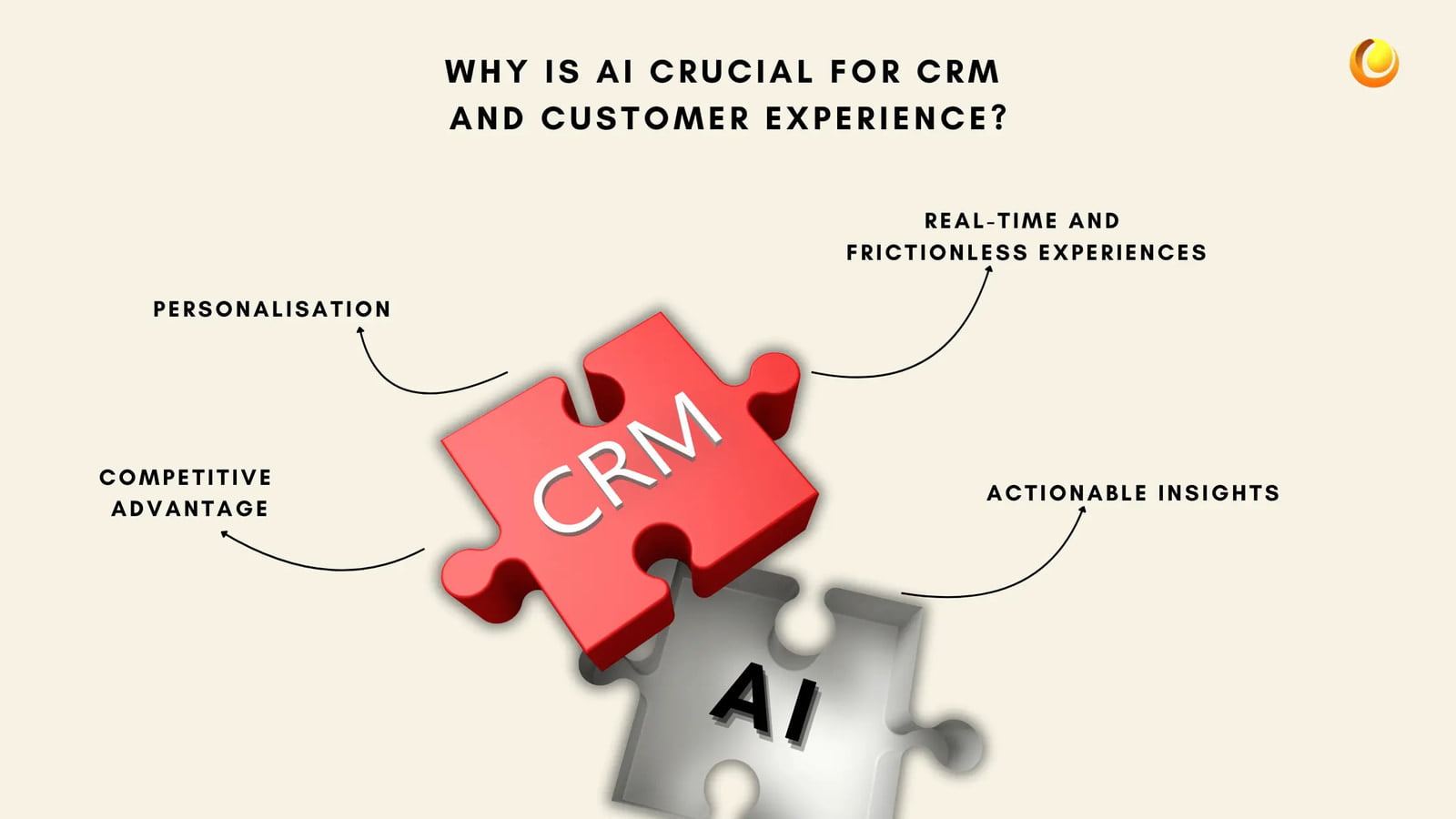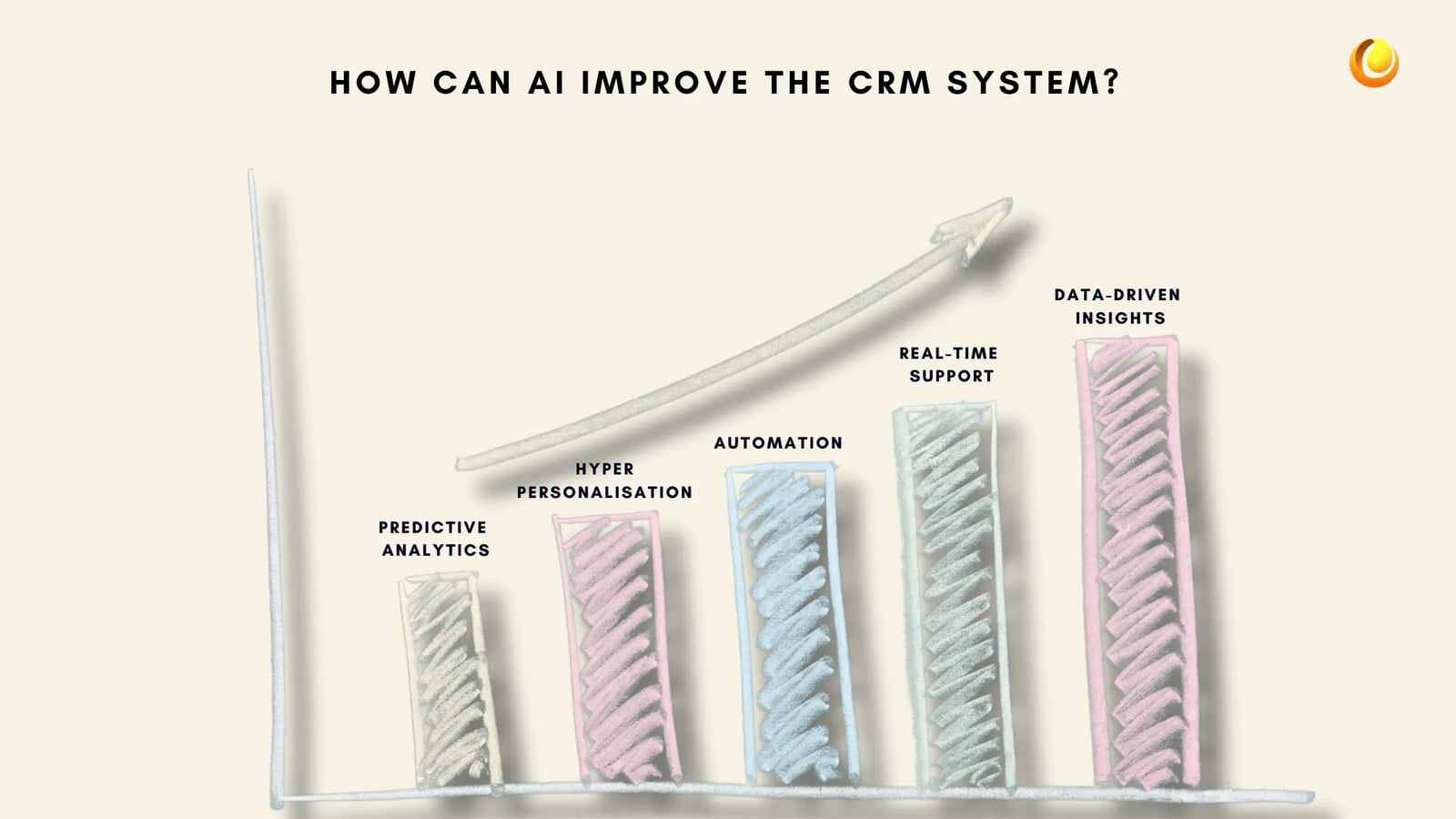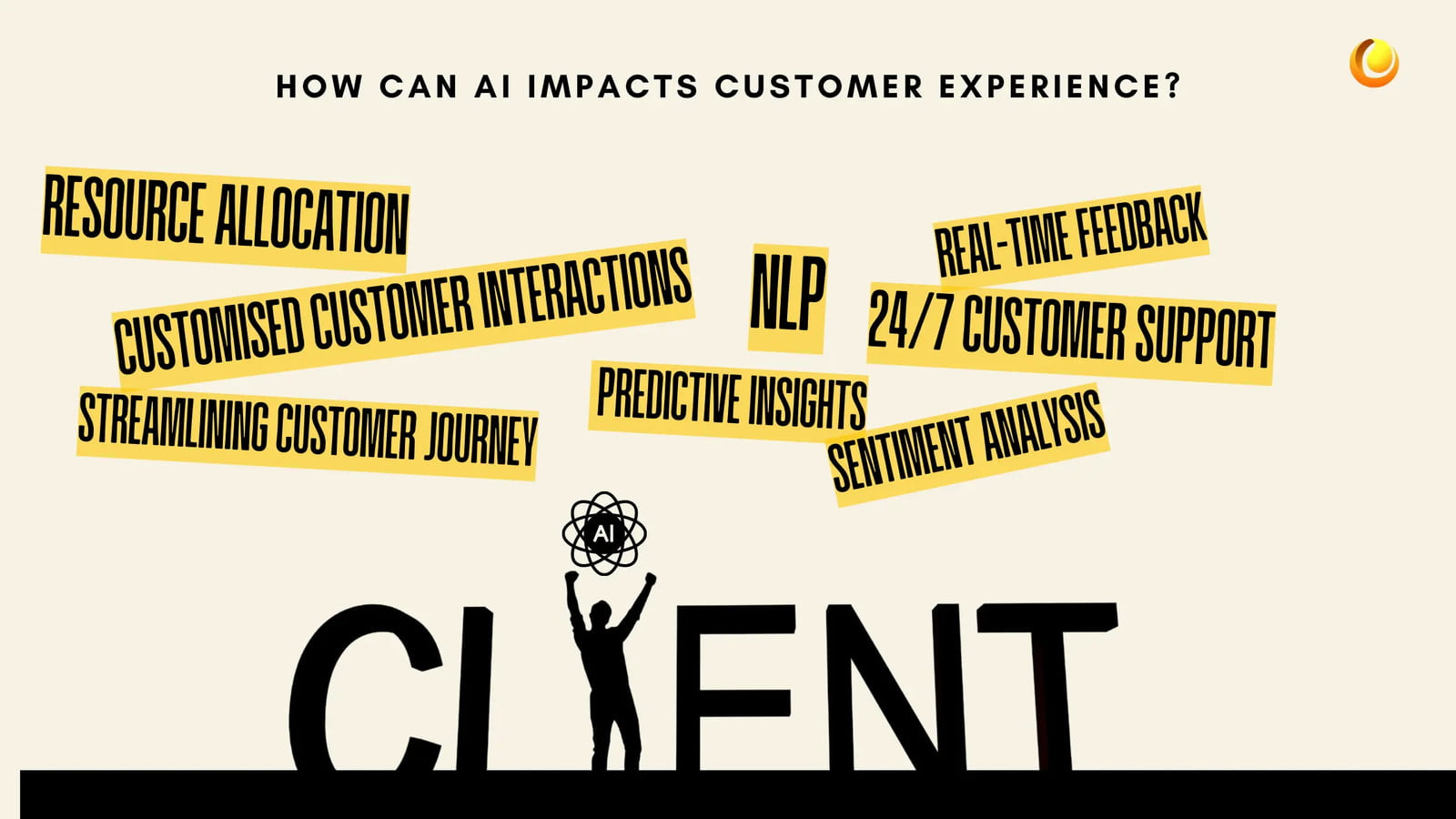
Introduction
Today, more and more businesses rely on AI aka Artificial intelligence, to redefine their business process, and thus, as a consequence, their CX. Customer experience and customer satisfaction are not a process of mere fulfilment of expectations but rather of delivering more personal, connected, and meaningful experiences with their products and services.
We will explore AI’s transformative impact on CRM and CX, breaking down how it works, the benefits it offers, the tools powering it, the challenges it faces, and what the future holds.
What is Artificial Intelligence in CRM and CX?
Artificial intelligence is a machine that simulates human intelligence. AI systems can analyse vast amounts of data, identify patterns, and make decisions or predictions with minimal human intervention.
Understanding customer behaviour and preferences better.
Automate tasks to improve efficiency and focus on strategic efforts.
Provide personalised and proactive support for customers.
For example, an AI system integrated into a CRM can predict when customers might churn based on their engagement history. Similarly, it can recommend tailored product suggestions based on a user’s browsing behaviour, creating a memorable customer experience. With technologies like AI, you can make your customer experience better.
Why is AI Crucial for CRM and Customer Experience?
Artificial Intelligence is no longer a buzzword-it's a requirement to survive as a business. Here's why AI is a must in today's modern CRM and CX strategies:

1. Keeping Up with the Changing Expectations of Customers
Today, customers expect personalisation, real-time, and frictionless experiences at every touch point. AI enables this experience through intelligent chatbots, predictive recommendations, and automated solutions. For example, a chatbot on a retail site can immediately answer questions about product availability or delivery options for instant customer satisfaction.
2. Retaining Competitive Advantage
Artificial intelligence is a must to implement in your processes, it's no longer an option if you want to compete. Market leaders like Amazon and Netflix use AI-powered systems to provide highly personalised recommendations, which sets the standard in customers' expectations. The business that does not adopt AI risks playing catch-up.
3. Actionable Insights
AI can analyse big data in real time, indicating and identifying trends, patterns, as well as anomalies. Such insights are incredibly useful in creating data-driven strategies that speak to the customer and drive business growth.
How Can AI Improves the CRM System?
Artificial intelligence changes the way customer relationship management systems, improving businesses to relate and understand their customers and interact with their customers. Here is how AI will revolutionise CRM to be effective, personalised, and insightful.

1. Predictive Analytics for Wiser Decision-making
Predictive analytics is one of the most precious aspects that AI integrates with the CRM. It is unthinkable the way the AI system predicts future behaviours from historical customer data with that much accuracy. For example, leads that will potentially turn into paying customers are easy to identify with AI support. It can even predict when a customer might churn. This capability lets the companies focus their resources and efforts on high-value opportunities. Conversion rates are increased and the strategies for sales get optimised since businesses rely on data-driven decision-making rather than instinct, thereby enabling an engagement to be done in a much more efficient as well as focused manner.
2. Hyper-Personalisation for Maximum Customer Interaction
The one-sise-fits-all days of marketing messages are dead. Artificial intelligence enables hyper-personalisation precisely because it goes so much deeper into the data of the customer, and businesses can design very bespoke experiences for each individual. Third, based on histories of past purchases, browsing, and other engagement patterns, AI can recommend to the customer what is most relevant to them in terms of products, services, or content. For instance, an e-retailer can offer something based on a customer's surfing or buying pattern history, and the service provider can send over customised propositions based on individual requirements. This will also personalise the experience of the customer, which, in turn, will create an impetus for brand loyalty and repeat business.
3. Automation of Repetitive Tasks for More Efficiency
AI can be applied universally in full application, automating mundane, repetitive tasks, so that employees spend more time on strategic initiatives. For instance, follow-ups on data entry or an appointment can easily be managed by Artificial intelligence while being accurate and consistent in a risk-free manner because it has no human dependence. It also enables businesses to respond very quickly, which has improved the customer experience from delays. By doing routine work with the use of AI, employees can concentrate more time on high-value activities such as relationship-building and problem-solving; therefore, in-house productivity and customer satisfaction are improved.
4. Real-time support for informed action
AI-based virtual assistants, including tools such as Salesforce Einstein or Zoho Zia, offer real-time support that will make the necessary insights available just in time for engagement with the customers. Such AI tools would be able to furnish data related to the preferences of customers, their previous interactions, and their purchasing history, thereby making the sales teams equipped to personalise outreach effectively by using timely data. For example, while communicating with a customer, a sales representative can get an instantaneous request for product or service recommendations based on the profile of that customer. Artificial intelligence helps teams of sales to make better decisions and, consequently, increases the chances of successful closing of deals.
5. Data-Driven Insights for Sales Enablement
AI helps in sales optimisation and guides the approach of sales teams with data-driven insights. Signals can therefore be sent by CRM systems to call a customer at the most opportune times, the best pricing strategy, and even spot upsell opportunities using Artificial intelligence. For instance, AI can analyse all the information that a company has on a customer and suggest when that customer is likely to make another purchase or what other product is likely to be needed. AI arms sales teams with actionable insights to engage the right customer, at the moment, with the right message that would otherwise improve their sales performance.
Here is one thing, you can also check out of new blog post on latest updates and news on CRM tech.
How Can AI Impacts Customer Experience
Artificial Intelligence is revolutionising customer engagement by bridging the gap between a business and customers by making an interface more efficient, personalised, and knowledgeable by leveraging AI in customer service and CRM systems. And this is how AI supports customer experience in the following ways:

1. Customised Customer Interactions
AI delivers the capability to highly customise business by analysing large amounts of customer data. AI systems can track customer behaviours, preferences and purchase history for the tailoring of how interactions may take place by recommending products or services that they will appreciate most according to tastes. Such customisation raises both customer satisfaction and the rate of conversion because people react better to relevant suggestions.
2. 24/7 Customer Support
AI-powered chatbots & virtual assistants give round-the-clock support that answers customer queries immediately. Unlike human agents, AI can process the needs of multiple customers together and minimise waiting time in pursuing prompt resolution. Whether it means responding to simple FAQs or navigating complex processes to assist customers, artificial intelligence ensures immediate assistance, ultimately culminating in increased satisfaction.
3. Predictive Insights and Recommendations
The analysis of historical data by AI would predict customer needs and preferences to offer solutions proactively before the customer has to ask for them. For example, e-commerce sites use AI to give recommendations about previous purchases and browsing behaviour and trends. Business companies will improve their relationship with customers by anticipating what they want to achieve, thereby increasing sales.
4. Efficient Problem Solving
Real-time analysis of customer problems by AI systems can highlight trends or the best possible action. In the context of customer service, it can forward a complaint directly to the relevant department or quickly provide instant troubleshooting steps. It saves time customers have consumed trying to solve the problem and enhances overall satisfaction with a service.
5. Natural Language Processing for Improved Communication
NLP is a subset of Artificial intelligence where ML (Machine Learning) will be used to understand human language, interpret it, and generate responses. This makes the AI-driven systems process customer communication-whatever it may be, an email, chat message, or social media interaction-in the most contextually correct manner with appropriate, pertinent, and accurate replies. That makes the customers satisfied because the interaction process becomes more human and natural.
6. Streamlining Customer Journey
AI makes the whole customer journey, from contact to after-sales interaction, smooth. Automation through AI nags customers at various stages of the sales funnel so that customers receive messages and support at the points of contact them. In this way, a frictionless experience cements loyalty between a brand and a customer.
7. Sentiment Analysis and Real-Time Feedback
For example, AI can now analyse customer feedback in real-time as a stream of text data and thus analyse the underlying sentiment behind comments, reviews, or social media posts; it then responds immediately to criticisms or builds on the positivity of an interaction with customers. This permits it to understand the sentiment to adjust strategies and, as such, better the overall experience. Artificial intelligence can help you understand customers’ sentiments better.
8. Efficient Resource Allocation
AI can enable an enterprise to optimise its supply resources by analysing the demand of its customers and predicting the peak time so that more clients can be served by customer service agents during times of high demand. It also helps organisations streamline inventory management, ensuring that the most popular products are always available and increasing satisfaction levels.
Tools Leveraging AI for CRM and CX
Businesses today can adopt a variety of AI-driven tools that improve their CRM and CX. Some of the most effective tools are:

1. Salesforce Einstein: Salesforce Einstein is an Artificial intelligence agent from Salesforce that employs features like
Sales forecasts auto-generation.
Predictive customer insights.
Sentiment analysis for email communications.
2. Zoho CRM and Zia:Zia is the AI assistant in Zoho CRM with the following capabilities
Sentiment analysis to track customer emotions
Predictive analytics on sales direction
Intelligent automation of repetitive tasks.
3. HubSpot AI: Implementation of Artificial intelligence through HubSpot AI (such as Breeze Copilot) happens in the following areas:
Personalisation of marketing email.
Information analysis of customer interactions.
To automate the process of lead nurturing.
4. ChatGPT: ChatGPT is a famous artificial intelligence chatbot. It is a conversational AI solution that makes CX even stronger through
Live customer support through human-like conversations.
Smart FAQs which get real-time updates using responses to frequently asked questions by the customer.
Dynamic, conversational marketing strategies.
Challenges in Implementing Artificial Intelligence
Many prospects abound in businesses embracing Artificial Intelligence, but its acceptance into business affords sundry problems for deep reflection. The key problems facing businesses as they embrace AI are elaborated below:
1. Data Privacy and Security
AI depends considerably on customer data in the creation of insights and a form of personalised push. It also throws a challenge on the subject of data privacy and compliance with regulations, such as GDPR, due to storage and processing security.
Therefore, a business should have good security measures, encrypt data, and also maintain transparency toward customers about data usage.
2. High Costs
Adoptions of AI may prove to be costlier as setting up the AI system initially also requires maintenance and training costs, which are rather unbearable for small and mid-sized businesses. Artificial intelligence can cost more than employees in some areas.
Businesses should look for flexible, scalable AI solutions or SaaS models that can spread the costs over time.
3. Lack of Skilled Talent
This requires expertise and the availability of competent experts is limited, which makes it difficult to implement Artificial intelligence. The companies can partner with AI vendors or consultants to fill this gap and train their staff on the management of AI tools.
4. Algorithm Bias
These biases would then be passed on to AI when they use training data, and some kind of unfounded or discriminatory outcome occurs. Businesses need to ensure that diverse data for training AI models are representative and continuously audited for fairer and more harmless biases.
5. Integration with Legacy Systems
It is not an easy and smooth process to integrate AI with older legacy systems. A phased approach accompanied by cloud-based solutions can work well in modernising the tech stack without disturbing the business running operations.
6. Fear of Change
The other reason for employee resistance may be the fear of job loss as AI is implemented in the organisation. Emphasise that AI enhances human work by reducing time-consuming repetitive activities while leaving room for core and creative work. Educating and training employees can certainly relieve these concerns.
7. Unclear ROI
Such returns on investment in AI projects cannot be measured accurately immediately. The clear objectives and KPIs for such projects with AI would help businesses monitor the success of the AI initiative and modify the strategy accordingly for value provision in the long run. Artificial intelligence can be unpredictable tech but you have to adapt to compete in the market.
Future of Artificial Intelligence in CRM and CX
The future of AI in CRM and CX is really promising. Emerging trends include:
Voice-activated CRMs: Employees and customers can use hands-free voice technology and interact more freely with their CRMs.
Emotion Recognition: Analysing the tone, facial expression, and language, AI systems will determine the emotional state of the customer for better engagement.
Self-Learning Algorithms: These will keep on learning and updating without being manually operated and accuracy will be enhanced within future AI systems.
Integration with IoT: AI will be perfectly integrated with all the IoT (Internet of Things) devices, so, it will provide real-time insights and smooth customer experiences.
Conclusion
Today it can just be a must-have rather than a luxury because AI is fast and increasingly becoming an essential tool for the survival of businesses wanting to thrive within this customer-centric marketplace. Hence, by using AI in CRM and customer experience strategy, a business may unlock unprecedented opportunities to reach customers in the deepest and most personalised manner. To them, artificial intelligence brings predictive analytics, hyper-personalisation, task automation, and real-time support pertinent yet bound to surpass modern customer needs and desires.
However, arising from the challenges of the adoption of AI, such as data protection and implementation cost, and workforce adaptability, businesses that would successfully step up the challenges will be in a strong competitive position to be at the industry's forefront.
Better days are ahead with AI in CRM and CX in terms of emotion recognition, voice-activated systems, and integration of IoT. Therefore, it is high time that business houses take the step forward with embracing AI no longer as a tool but as a strategic drive for growth, customer loyalty, and long-term success.
If you are looking for the next level in your CRM and customer experience, then IT Solutions Solved is the destination. With our excellent CRM implementation and consulting experience, we can empower you to power up with technologies like Artificial intelligence for your business and bring it to the next level. Connect with us now and get started building smarter, CRM solutions for your business!





